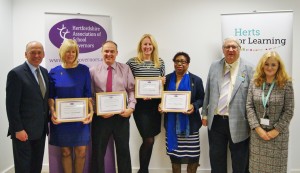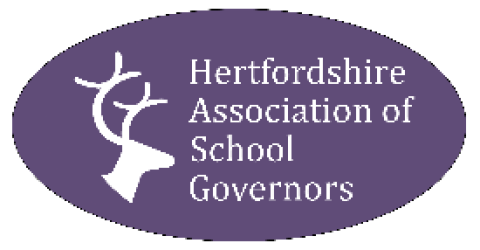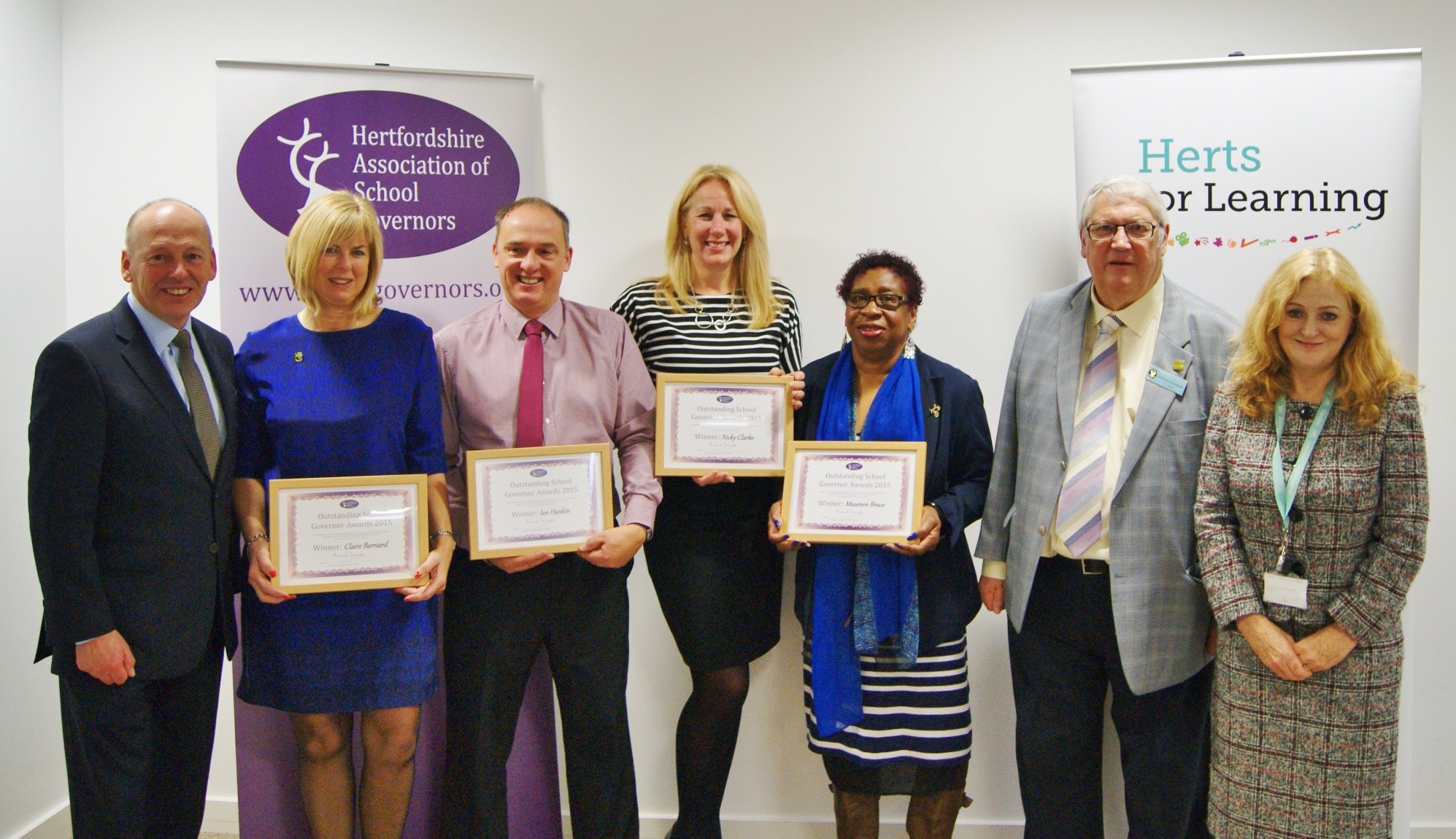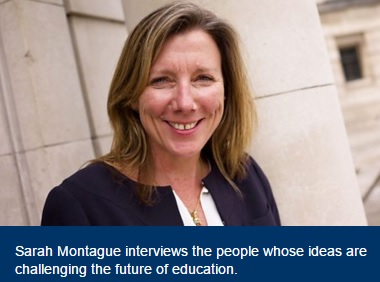 January 2016 HfL Chairs’ Briefing
January 2016 HfL Chairs’ Briefing
This briefing contains:
Chairs Service – 07580 884610/01438 843082
Helpdesk – 01438 843038
http://www.hertsforlearning.co.uk/team/governance
http://www.hertsdirect.org/services/edlearn/getinvolved/governors/
Chairs Networks
Venues and times:
1st February 2016 – Ramada Hotel, Hatfield, 6.30 networking and refreshments, for 7.00 p.m. start
11th February 2015 –- Theobalds Hotel, Cheshunt, 6.30 networking and refreshments, for 7.00 p.m. CANCELLED
David Kilgallon – Current Political Schools Landscape
Multi-Academy Trusts, Federations and Cooperatives
The meetings are free for up to 2 governors from schools which subscribe to the Chairs Service. To book: http://www.hertsdirect.org/actweb/WDC/sseo/template_001.cfm?pageID=28&template=courseDetails&courseID=CSM01
These networks are recommended for Chairs, Vice Chairs and Chairs of Committees particularly. Those attending should feed back to their governing body. When you receive this briefing, you may like to forward it on to your Vice Chair and Chairs of Committees and also your Headteacher. If you have any queries about the Networks or topics you would like discussed, please contact kathy.dunnett@nullhertsforlearning.co.uk
News Reports
The independent is reporting that during an appearance on BBC2’s Newsnight on Monday, Sir Michael Wilshaw, chief inspector of schools in England and head of Ofsted, was asked if he would back the banning of the coverings in schools, to which he answered: “Yes, I would.”
Education Secretary Nicky Morgan announces package of measures to protect children from extremism
The Education Committee’s report on the role of Regional Schools Commissioners (RSCs) finds that more work is needed to improve the transparency, accountability and working relationships of RSCs. Eight RSCs were appointed in 2014 with responsibility for approving and monitoring academies and free schools in their region.
Schools Week has published an article on The 24 recommendations in the Regional Schools Commissioner report – and what they really mean
A tool to provide schools in England with an indication of their efficiency compared with similar schools.
DfE guidance: Dealing with issues relating to parental responsibility
Departmental advice about dealing with issues relating to parental responsibility.
The following DfE timelines have been updated for spring 2016 :
Information to help headteachers, principals and governors of academies plan for the academic year ahead.
Information to help local-authority-maintained schools plan for the academic year ahead
Information to help free schools, university technical colleges (UTCs) and studio schools plan for the academic year ahead
Information to help pupil referral units plan for the academic year ahead
Useful information to help academies plan for the academic year ahead
Useful information to help local-authority-maintained schools plan for the academic year ahead
Useful information to help free schools, university technical colleges (UTCs) and studio schools plan for the academic year ahead
Useful information to help pupil referral units plan for the academic year ahead
The BBC is reporting that an academy chain is scrapping the current form of governing bodies for its schools in England.
New NGA guidance: A Governors’ Guide to Sixth Forms
http://www.nga.org.uk/Home.aspx
Schools with sixth forms are going through a time of transition. Over the next few years governing boards will be faced with difficult decisions around the 16-19 curriculum offer, budgeting, collaborations and, in some cases, the future sustainability of a school’s sixth-form. NGA has responded by producing a new comprehensive guide to assist boards in making these decisions. Although aimed at those governing in schools where a sixth form provision already exists, the guidance will also help boards considering the viability of opening new provision in their school. See website for details.
Resources for your governors and school leaders
Make sure your governing board and school leaders are informed about the free resources on the NCTL open access platform There is a range of useful toolkits and guides.
Governor Recruitment – Inspiring the Future Website
Inspiring the Future has released two new videos to showcase how its free online matchmaking service works to connect prospective governors with schools and colleges nationwide. Volunteers sign up to become a governor or trustee, giving their location and listing the skills and experience they can bring to a board. Governing boards seeking new governors can view all the volunteers in their area or specify the skills they’re looking for, connect with volunteers directly and begin the process of recruiting. http://www.inspiringthefuture.org/inspiring-governors/governors-sign-up-as-a-volunteer/ Click here to see the new videos
Do you know other chairs of governors who could be NLGs?
Our next designation round will open on Monday 22 February 2016. We’re looking for high quality, experienced chairs that have the capacity and expertise to support other chairs to improve their governing bodies. We’re particularly interested in chairs with experience of governance in multi-academy trusts. This round will be targeted geographically to ensure we have NLGs in the areas with the greatest need. Hertfordshire is a targeted area.
If you know any colleagues who meet the eligibility criteria, please encourage them to visit our web pages for potential applicants.
Local Opportunities and Information
Schools Financial Value Standard Return 2015-16
All maintained schools must submit a Schools Financial Value Standard (SFVS) Return for the year ended 31 March 2016 to their local authority. In Hertfordshire, returns must be emailed to the Shared Internal Audit Service (SIAS) at sias@nullhertfordshire.gov.uk by 15 April 2016.
Returns should be completed in excel using the 2015 template on the Grid at http://www.thegrid.org.uk/info/internal_audit/sfvs_guidance.shtml. This allows SIAS to analyse and use the data contained in all returns and comply with the requirement that data in the forms is used to inform audit coverage.
The template contains the Department for Education’s current SFVS guidance for completion of the 2015-16 return.
In order to complete the return, governors must consider the financial controls operating in the school over the past twelve months. Dependent on arrangements in an individual school, the completion of the return should be an agenda item for either the full governing body or the finance committee. Once complete, the return should be emailed to sias@nullhertfordshire.gov.uk. A paper copy signed by the Chair of Governors should be kept at the school.
Further guidance on the SFVS can be found at http://www.thegrid.org.uk/info/internal_audit/.
Details of ‘Completing your SFVS Return’ courses can be found by e-mailing gov.courses@nullhertsforlearning.co.uk/
Individualised guidance can be purchased from SIAS at a cost of £350 per day should your school need personalised support.
If you have a query that can’t be answered from the information provided on the Grid, then please contact Sally-Anne Pearcey on 01438 845516 or email sally-anne.pearcey@nullhertfordshire.gov.uk.
Teach in Herts Teacher Recruitment Fair 2016
Following the success of the first Teach in Herts Teacher Recruitment Fair in 2015, the Board of Herts for Learning has committed to proactively help fund and support Hertfordshire schools once again, by running a second teacher recruitment fair on Saturday 19th March 2016 at Hertfordshire Development Centre, Stevenage.
All Hertfordshire shareholding schools are once again invited to attend and exhibit on a stand free of charge.
The event is restricted to HfL shareholding schools only and no third party agencies will be permitted to attend.
Stands at the event can be booked from Monday 18th January 2016. To book for your school/cluster of schools, please email teachinherts@nullhertsforlearning.co.uk. Space is limited and stands will be allocated on a first come, first served basis. Closing date for booking a stand is Monday 7th March 2016. Guidance on putting a stand together will be provided by the Herts for Learning Events team and will emailed to you once your stand booking has been confirmed.
The recruitment fair will be open between 10.00am and 3.30pm and attending schools should have staff available on their stand for the whole day. Many attendees that arrived mid-afternoon last year were disappointed to find a number of schools had left prior to the end of the event. Wherever possible, materials for your stand should be delivered to Hertfordshire Development Centre during the afternoon of Friday 18th March.
Further information and marketing materials to promote the recruitment fair through governor, staff and parent networks will be sent out to schools over the coming weeks. We would appreciate it if you could disseminate these widely to promote the event and help to make it a success for all.
The Exchange – January/February edition
The January/February edition of the paper is now in schools, with a spotlight on science including ideas for science week, how to take part in Safer Internet Day 2016 and also news from Hertfordshire schools’ and Herts for Learning.
This HfL monthly newspaper has something for all staff based in schools and school governors, whether looking for a little light reading on current educational news or for courses to further your professional development.
The link to the online version can be found here: bit.ly/TE-JanFeb16
This edition also includes:
- information on the 2016 Recruitment fair
- discount rates for Encyclopaedia Britannica
- how schools can benefit from a new budget toolkit
- Hertfordshire school contacts British astronaut Major Tim Peake
- P2P pilot launches in secondary school
- and much more!
Do you have something you want us to cover? Get in touch! The Exchange Team – 01438 844331
If you or your chair of governors would like to receive extra copies for the governing body please get in touch. We welcome any feedback or content suggestions for future editions.
Training Opportunities
WRAP
Call Jessica Broadbent / email on 01438 844 331 / Jessica.broadbent@nullhertsforlearning.co.uk
They are running events on the following date and times:
10th March at Robertson House, Stevenage:
(Sessions are 1.5 hours)
10-11.30am
1.30-3.00pm
4.00-5.30pm
7.00-8.30pm
More Chairs Stuff
http://www.hertsdirect.org/services/edlearn/getinvolved/governors/infoforchairs/
Chairs Advanced Training
For all Chairs – new, experienced, Chairs of Governors, Vice Chairs and Chairs of Committees.
It is advised to undertake the whole course, as the skills are built up throughout the two terms that it runs, from January to July every year. Book now on the website.
| CRW1 |
Advanced Chairs: Report Writing |
25/02/2016 |
Thursday |
6.30-9pm |
Ware Priory |
| CLS1 |
Advanced Chairs: Leadership Skills |
09/03/2016 |
Wednesday |
6.30-9pm |
Hilton, Watford |
| CRP2 |
Advanced Chairs: Reflective Practice |
19/04/2016 |
Tuesday |
6.30-9pm |
Holiday Inn, Hemel |
| CDD2 |
Advanced Chairs: Dealing with Difficult People |
04/05/2016 |
Wednesday |
6.30-9pm |
Barnwell, Stevenage |
| COM3 |
Advanced Chairs: Coaching & Mentoring |
17/05/2016 |
Tuesday |
6.30-9pm |
Holiday Inn, Hemel |
| CMD3 |
Advanced Chairs: Mediation |
07/06/2016 |
Tuesday |
6.30-9pm |
Barnwell, Stevenage |
| CCH4 |
Advanced Chairs: Change Management |
15/06/2016 |
Wednesday |
6.30-9pm |
Hilton, Watford |
| CNV1 |
Advanced Chairs: Investigations |
30/06/2016 |
Thursday |
6.30-9pm |
Ramada, Hatfield |
Hertfordshire Association of School Governors
http://www.hertsgovernors.org/
http://goo.gl/j2ycXz




 January 2016 HfL Chairs’ Briefing
January 2016 HfL Chairs’ Briefing



 BBC Radio 4: The Educators
BBC Radio 4: The Educators The School Food Standards, as you may be aware, came into force in January 2015 and legally require all schools, excluding academies established between September 2010 and June 2014, to make milk available to children at any time during the school day.
The School Food Standards, as you may be aware, came into force in January 2015 and legally require all schools, excluding academies established between September 2010 and June 2014, to make milk available to children at any time during the school day.